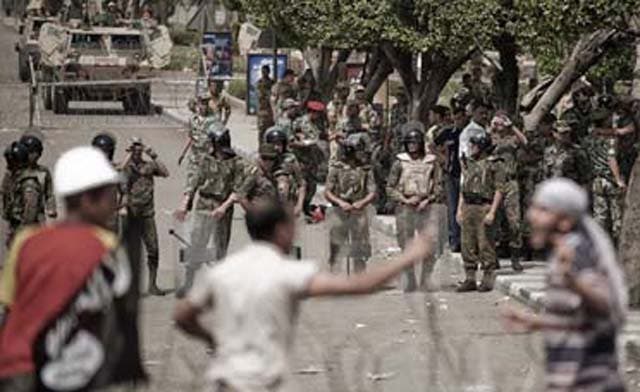Egyptian journalists slam state TV for hosting Israeli expert
Egyptian journalists were outraged at a phone interview state TV conducted with an Israeli military analyst following the deadly attacks in the Sinai Peninsula.
A group of journalists lashed out at the state-owned Nile News channel and state TV in general for hosting strategic expert Eyal Alima to comment on the attacks that claimed the lives of 16 border soldiers and on the funeral that followed.
Using social networking websites, they called on the Press Syndicate to hold Information Minister Salah Abdel Maksoud accountable for violating a decree that bans all forms of normalization with Israel, the website of the Egyptian official newspaper al-Ahram reported.
In the phone interview, which lasted for one minute and a half, Alima stressed the necessity of cooperation between Egypt and Israel in order to tighten security in the volatile border area.
“What happened is a warning to both countries so that they should be careful in the future and make sure such incidents do not recur,” he said.
In the first interview of its kind since the signing of the Camp David peace treaty in 1979 between Egypt and Israel, Alima accused militants from the Gaza Strip for being directly responsible for the attacks.
Laila Abdel Meguid, professor of TV at the Faculty of Mass Communication at Cairo University, said that hosting Alima was an unprecedented step that is bound to break the existing barrier between Egyptians and anything Israeli.
“After the 1973 war, Egyptian state TV would not even feature pictures of Israeli officials. This started changing gradually and now we accept seeing them,” Meguid said.
Meguid also argued that this development, including hosting Alima, is more professionally logical since it is quite normal to go back to all parties involved in order to get the full picture.
Emad Gad, former MP and an expert on Israeli affairs, agreed that this step constitutes a major shift in the stance adopted for decades by state TV.
“We are now at the stage where we break all givens,” Gad said.
Sameh Ragaei, head of news coverage in Nile News, said that hosting Alima was not pre-planned and that it was the initiative of the editor.
“The editor improvised and made a mistake,” he said.
However, Ragaei stressed that the interview is not a sign of normalization, but just an attempt to get both opinions.
“The interviewee wanted to have the argument and the counter-argument and that is why she interviewed a Palestinian party after Alima.”
The interview with Alima was followed by another with Palestinian political analyst Abdul Majid Sweillam.
